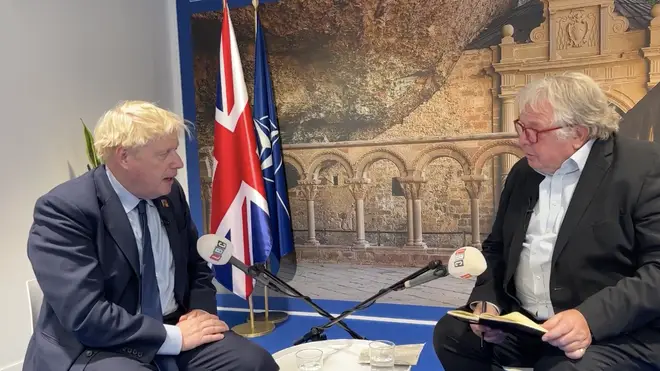
Richard Spurr 1am - 4am
30 June 2022, 17:24 | Updated: 1 July 2022, 17:10

PM: Putin's made over 30 nuke threats during Ukraine invasion
Vladimir Putin has made more than 30 chilling nuclear threats since his military invaded Ukraine, Boris Johnson has said.
An agreement to end the war is possible with Putin in power despite the Russian autocrat making more than 30 threats over nuclear deployments, the Prime Minister told LBC's Nick Ferrari at Breakfast.
He added that the Russian president can negotiate a peace and be allowed to claim he needed to invade as long as he withdraws his troops, and does not need to give up power at the end of the war.
Asked how many times Mr Putin had referred to nuclear deployments – having often remarked about his country's arsenal during the invasion and leaving Western countries wary of a strike against Ukraine – Mr Johnson said: "There's an analysis that I think has been done by somebody recently… a think tank… 35 mentions, or perhaps it's a little bit more now, of that issue.
You can listen to Nick's interview with Boris Johnson from 7am on Friday on Nick Ferrari at Breakfast. Listen on LBC and Global Player
"But I think it's very, very important that we shouldn't allow ourselves to be sidetracked by this kind of sabre-rattling.
"Because fundamentally what Putin is trying to do is to reframe this, say it's about Russia versus Nato, about a standoff of that kind.
"It's not. It's about his attack on an entirely innocent country with conventional weapons, with artillery, bombardments and planes, shells and so on.
"And it's about the Ukrainians' right to protect themselves, that is what this is about."

Asked if the war in Ukraine needed to end with Putin giving up power, Mr Johnson said: "No, of course not."
He said Putin could negotiate an end to the conflict and went on: "The Russian president actually enjoys very considerable levels of public support in Russia… depending on how you measure these things.
"He has a considerable margin of manoeuvre, to say 'look, I went in, I had to achieve certain things', and it will be up to him to specify what he thought that those were.
"'But in the interests of peace, in the interests of the world, the time has come to bring the technical military operation to an end, and to withdraw and to seek a new arrangement' [Putin could say].
"That is what I think he should do."
Mr Johnson has long stressed that Ukraine should not be bounced into a hasty peace with Russia that could see it give up swathes of territory.
The UK is concerned some Western allies could try to push Kyiv into an agreement with Russia as "war fatigue" and the economic crisis caused by the invasion hits.
Read more: 'Kaboom!' Ukraine celebrates Putin's humiliation as Russia retreats from Snake Island
Mr Johnson has earned credit for arming and supporting Ukraine's defence, which helped determined soldiers resist the Kremlin's forces' march on Kyiv and force it into a narrower mission, concentrating instead on capturing the east of the country.
The PM told Nick that while Nato fully supports Ukraine, it is important not to allow Putin to frame it as a battle between Russia and the military alliance.
Mr Johnson has also become embroiled in a bizarre spat with Putin, after the PM and Canadian leader Justin Trudeau joked about G7 leaders showing off their bodies and going topless like the Russian president did in the past.
Read more: Putin mocks G7 leaders' lack of 'machismo' and says PM would look 'disgusting' topless
"I don't know how they wanted to get undressed, above or below the waist," Putin said.
"But I think it would be a disgusting sight in any case."
Mr Johnson also defended his military policy as his defence secretary Ben Wallace pushes for a rise in spending.
Britain is due to reduce its army from 82,000 to 72,500 regular soldiers by 2025.
Mr Johnson said he wanted to invest money in equipment that will win future battles.
"We're investing massively in our armed forces, the biggest uplift since the end of the Cold War, £24bn more," he said.
"Last year, the UK was the third biggest spender on defence in the world. We're now 2.3% of our GDP, way above most of the people around the table in Nato.
"So on the specific point about each individual soldier, the issue for us, is how do you make our army as agile, as lethal, as capable as possible?
"How do you make sure they have the equipment, the training, the technology they need to defeat our enemies?
"By making sure that they have the kit that is absolutely indispensable.
"Secondly, don't forget, when we actually engage in combat, we engage as an alliance. The UK typically is going to be way out in front… look at our naval contributions, enormous.
"Look at what we can do on cyber.
Of course you’ve got to have a big enough army, you’ve got to have enough troops, enough muscle power to do what you need to do. That’s crucial, we'll never make any concessions there, but you’ve also got to make sure you do have are properly equipped."
He announced on Thursday that he will raise it to 2.5% of GDP. It is projected to reach 2.3% by the end of this year. This could result in a budget of £74.5bn in 2029-30.